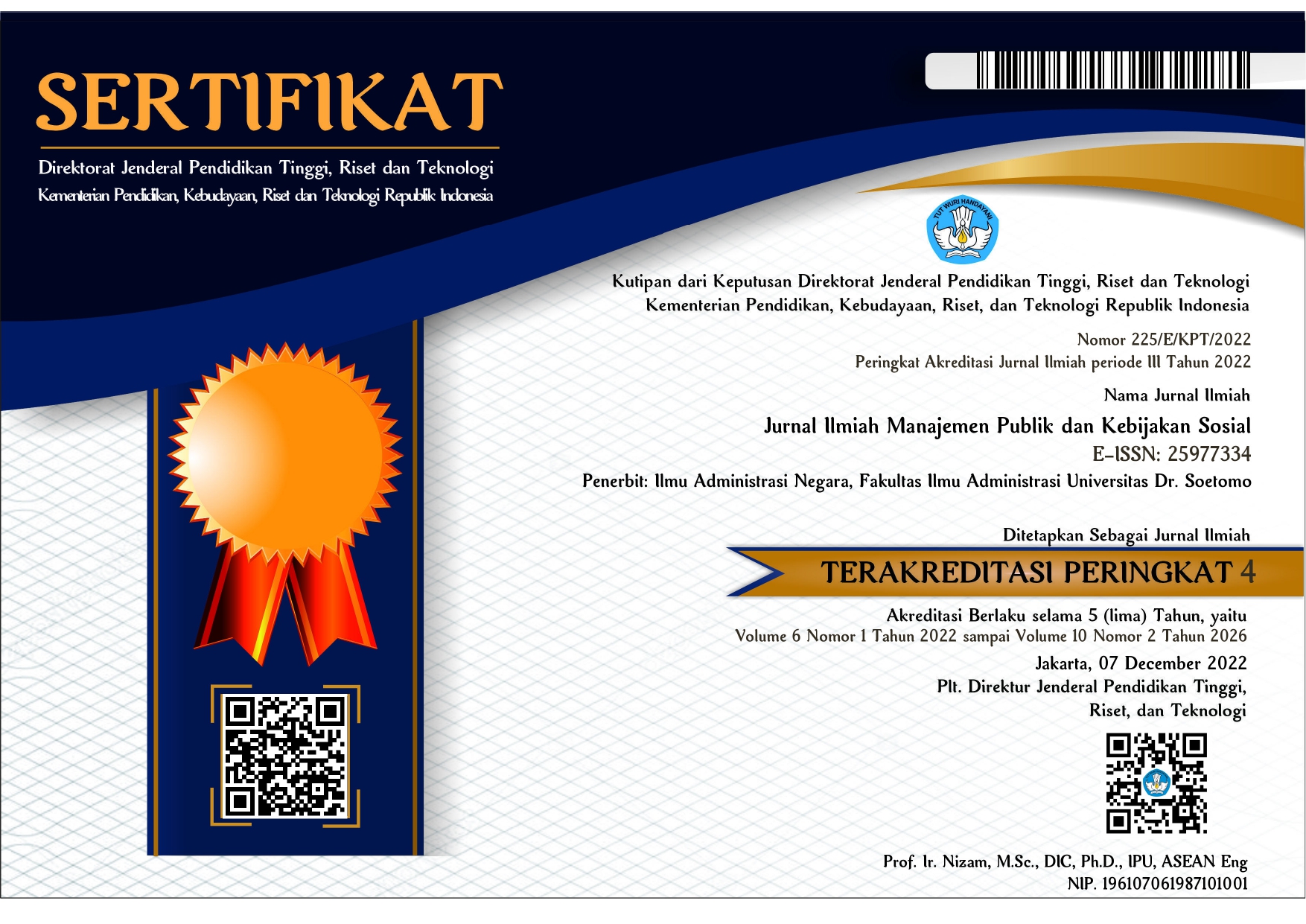Implementasi Program Desa Berdaya Melalui Budidaya Maggot Di Kabupaten Mojokerto
 Abstract views: 313
,
Abstract views: 313
,
 PDF (Bahasa Indonesia) downloads: 259
PDF (Bahasa Indonesia) downloads: 259
Abstract
The increase in the amount of waste has become a serious problem, where it has an impact on several aspects of life, for example air and environmental pollution. Maggot cultivation is the most suitable solution for sustainable waste management and has the capability and appropriate solution for converting organic waste such as fruit, vegetables, animal waste and household waste which can reduce the burden on landfills and has economic value. Researchers applied this type of qualitative research with the aim of obtaining information in the form of descriptions or in-depth and comprehensive explanations regarding the Implementation of the Empowered Village Program through Maggot Cultivation in Sidoharjo Village, Gedeg District, Mojokerto Regency. There are several data collection methods through documentation, field notes and interviews. Then, the data is analyzed through the process of data collection, data presentation, data compression and verification or drawing conclusions which will be applied as qualitative data analysis. These findings show that the implementation of the Empowered Village Program through Maggot Cultivation in Sidoharjo Village has been running effectively and strengthening the village economy. The focus of implementing this program is centered on policy and environmental aspects. The policy aspect includes six points, such as interests affected, types of benefits, desired level of change, decision-making structure, program implementers, and resource allocation, all of which play an important role in the implementation process. Meanwhile, the implementation environment includes the interests, power, strategies of existing actors, criteria of institutions and leaders, as well as obedience and responsiveness, all of which are key factors in the successful implementation of the program.
References
Abdul Wahab, S. (2008). Analisis Kebijaksaan dari Formulasi ke Implementasi Kebijaksanaan Negara. Bumi Aksara.
Abdoellah, Awan Y. & Rusfiana, Y. (2016). Teori & Analisis Kebijakan Publik. Alfabeta.
Agustino, L. (2016). Dasar-Dasar Kebijakan Publik. Alfabeta.
Andrianto, R. H., & Damayanti, M. (2018). Pemberdayaan Masyarakat Dalam Pengembangan Desa Wisata, Studi Kasus : Desa Wisata Pentingsari, DIY. Jurnal Teknik PWK, 7(4), 242–250.
Anggara, S. (2014). Kebijakan Publik. Pustaka Setia.
Desa, P., Melalui, B., Keuangan, P., Lapak, P., Di, D., Kebontunggul, D., Gondang, K., & Mojokerto, K. (2020). Ekobis abdimas. 1, 1–7.
Dewi, D. S. K. (2016). Kebijakan Publik Proses, Implementasi, dan Evaluasi. samudra biru.
Hendiyani, M. F. (2019). Inovasi Pelayanan Publik Di Kota Kreatif Dalam Meningkatkan Kepercayaan Masyarakat Terhadap Pemerintah Di Kota Bandung Provinsi Jawa Barat. TRANSFORMASI: Jurnal Manajemen Pemerintahan, 103–126.
Hertati, D., & Arif, L. (2022). Collaborative Governance in the Management of a Waste Bank. The 3rd International Conference on Governance, Public Administration, and Social Science (ICoGPASS), 1–13.
Hertati, D., Nurhadi, & Tukiman. (2023). Penta Helix Collaboration Model in Handling Problems of Waste Management. 7st International Seminar of Research Month 2022, 371–377.
Kaharap, Y., Dotrimensi, D., Setiawan, F., & Nasution, R. P. S. (2023). Pelatihan Pengembangan Maggot sebagai Pakan Ternak di Desa Karang Tunggal, Kec Parenggean sebagai Model Kewirausahaan Sosial Masyarakat. AKM: Aksi Kepada Masyarakat, 3(2), 307–326.
Lestary, R. A., Hadi, K., Romadhan, A. A., Pemerintahan, S. I., Ilmu, F., Politik, I., & Malang, M. (2022). Implementasi Program Desa Berdaya Melalui Economic Branding Pada Dinas Pemberdayaan Masyarakat dan Desa Kabupaten Lamongan Covid-19 melalui Padat Karya Tunai Desa menjadi tanggung jawab pemerintah Pembangunan pedesan yang terlambat juga dialami oleh beber. Jurnal Ilmu Administrasi Negara ASIAN (Asosiasi Ilmuwan Administrasi Negara), 10(1), 340–352.
Miles, M. B., Huberman, A. M., & Saldana, J. (2014). Qualitative Data Analysis: A Methods Sourcebook (Third). SAGE Publications.
Moleong, L. J. (2018). Metodologi penelitian kualitatif. Remaja Rosdakarya.
Nguyen, T. T. X., Tomberlin, J. K., & Vanlaerhoven, S. (2015). Ability of Black Soldier Fly (Diptera: Stratiomyidae) Larvae to Recycle Food Waste. Environmental Entomology, 44(2), 406–410.
Ramdhani, A., & Ramdhani, M. A. (2017). Konsep Umum Pelaksanaan Kebijakan Publik. Jurnal Publik, 1–12.
Sugiyono. (2019). Metode Penelitian Kuantitatif, Kualitatif, R&D. Alfabeta.
Sukemi. (2021). BUDIDAYA MAGGOT BSF SEBAGAI PAKAN TERNAK.
Tahir, A. (2014). Kebijakan Publik dan Transparansi Penyelenggaraan Pemerintahan Daerah. Alfabeta.
TKPK Jatim. (2020). Desa Berdaya.
Undang Undang Nomor 6 Tahun 2014 Pasal 1 angka (6), (2014).
Wahed, M., Asmara, K., & Wijaya, R. S. (2020). Pengembangan Ekonomi Desa Dengan Instrumen Badan Usaha Milik Desa (BUMDESa). Journal of Regional Economics Indonesia, 1(2), 58–70.
Zakat, R. (2020). Desa Berdaya.
Copyright (c) 2024 Dwi Mifta'ul Tesya, Tukiman

This work is licensed under a Creative Commons Attribution-ShareAlike 4.0 International License.
Authors who publish with JIMPKS: Jurnal Ilmiah Manajemen Publik dan Kebijakan Sosial agree to the following terms:
-
Authors retain copyright and grant the journal right of first publication with the work simultaneously licensed under a Creative Commons Attribution License (CC BY-SA 4.0) that allows others to share the work with an acknowledgment of the work's authorship and initial publication in this journal.
-
Authors are able to enter into separate, additional contractual arrangements for the non-exclusive distribution of the journal's published version of the work (e.g., post it to an institutional repository or publish it in a book), with an acknowledgment of its initial publication in this journal.
-
Authors are permitted and encouraged to post their work online (e.g., in institutional repositories or on their website) prior to and during the submission process, as it can lead to productive exchanges, as well as earlier and greater citation of published work.










